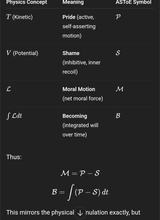Anonymous
6/19/2025, 7:02:30 PM No.40561605
Theists and especially Christians have no good answer to the problem of evil
The world is filled with horrifying, gut-wrenching evil. Billions of sentient beings die every second. Thousands of children die of preventable disease every day. For billions of years, animals have been suffering and dying—in numbers we cannot fathom, across time scales we cannot fathom.
Such a thing is obviously incompatible with the existence of a perfect God.
Are the aforementioned things bad? Is the world a worse place because it has cancer in it? Is it worse because it has malaria and genocide and starvation and predation? Anyone of remotely sane ethical persuasion would have to obviously answer yes. The theist, however, is tasked with explaining why a perfectly just, merciful, loving, and powerful God fails to intervene to stop these horrors. He could stop them with a thought, make it so that no child has to starve to death in her mother’s arms merely by saying the word. Why doesn’t he?
The theist doesn’t merely need to think that each of the world’s apparent evils are secretly so good that they shouldn’t be abolished (after all, if they should be abolished and God can abolish them, why doesn’t he?) They don’t merely have to think that it would be wrong of God to have intervened to stop COVID or 9/11 or the Nazi Holocaust. They must think that God couldn’t have set up the world in any better way. Not only does some great good come from the holocaust that makes it so that God should not prevent it, God apparently—in his infinite wisdom and majesty—could not have achieved that good in any other way.
Could any proposition be more absurd? Could anything be more ludicrous on its face than the notion that there is a good reason for babies to get cancer, for animals to starve, and for natural disasters to ravage the world claiming countless lives? Could anything be more ridiculous than the idea that these are uniquely required for some greater goods?
The world is filled with horrifying, gut-wrenching evil. Billions of sentient beings die every second. Thousands of children die of preventable disease every day. For billions of years, animals have been suffering and dying—in numbers we cannot fathom, across time scales we cannot fathom.
Such a thing is obviously incompatible with the existence of a perfect God.
Are the aforementioned things bad? Is the world a worse place because it has cancer in it? Is it worse because it has malaria and genocide and starvation and predation? Anyone of remotely sane ethical persuasion would have to obviously answer yes. The theist, however, is tasked with explaining why a perfectly just, merciful, loving, and powerful God fails to intervene to stop these horrors. He could stop them with a thought, make it so that no child has to starve to death in her mother’s arms merely by saying the word. Why doesn’t he?
The theist doesn’t merely need to think that each of the world’s apparent evils are secretly so good that they shouldn’t be abolished (after all, if they should be abolished and God can abolish them, why doesn’t he?) They don’t merely have to think that it would be wrong of God to have intervened to stop COVID or 9/11 or the Nazi Holocaust. They must think that God couldn’t have set up the world in any better way. Not only does some great good come from the holocaust that makes it so that God should not prevent it, God apparently—in his infinite wisdom and majesty—could not have achieved that good in any other way.
Could any proposition be more absurd? Could anything be more ludicrous on its face than the notion that there is a good reason for babies to get cancer, for animals to starve, and for natural disasters to ravage the world claiming countless lives? Could anything be more ridiculous than the idea that these are uniquely required for some greater goods?
Replies:











